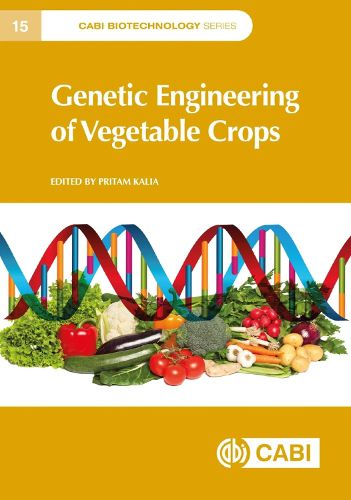Readings Newsletter
Become a Readings Member to make your shopping experience even easier.
Sign in or sign up for free!
You’re not far away from qualifying for FREE standard shipping within Australia
You’ve qualified for FREE standard shipping within Australia
The cart is loading…






Conventional plant breeding alone can no longer sustain the rising global demand for food. Genetic engineering technology makes it possible to develop new crop varieties with improved yield performance, specific quality attributes (external and internal in vegetable crops), resistance to diseases and insect pests, and environmental stresses. Genetic engineering technology for developing GM crops is complementary to genome editing and other breeding technologies. In addition to food requirements, transgenic crops have the possibility to carry edible vaccines and therapeutic proteins, to help combat human disease and malnutrition. This book reviews the importance and safety of transgenic vegetable crops and covers a wide variety of crops and different technologies. It includes: Genetic engineering in tomato, eggplant, peppers, amaranth, cauliflower, carrot, cucurbits, potato, tropical tubers and melons. Transgenic resistance to viral diseases. Embryogenic cell suspension culture. Genome editing and CRISPR/Cas9. Molecular techniques for biofortification. RNAi strategies for vegetable crop improvement. Designing futuristic vegetable crop varieties. This book is suitable for researchers in horticulture, plant science, and agricultural biotechnology as well as practitioners in vegetable breeding and seed production.
$9.00 standard shipping within Australia
FREE standard shipping within Australia for orders over $100.00
Express & International shipping calculated at checkout
Conventional plant breeding alone can no longer sustain the rising global demand for food. Genetic engineering technology makes it possible to develop new crop varieties with improved yield performance, specific quality attributes (external and internal in vegetable crops), resistance to diseases and insect pests, and environmental stresses. Genetic engineering technology for developing GM crops is complementary to genome editing and other breeding technologies. In addition to food requirements, transgenic crops have the possibility to carry edible vaccines and therapeutic proteins, to help combat human disease and malnutrition. This book reviews the importance and safety of transgenic vegetable crops and covers a wide variety of crops and different technologies. It includes: Genetic engineering in tomato, eggplant, peppers, amaranth, cauliflower, carrot, cucurbits, potato, tropical tubers and melons. Transgenic resistance to viral diseases. Embryogenic cell suspension culture. Genome editing and CRISPR/Cas9. Molecular techniques for biofortification. RNAi strategies for vegetable crop improvement. Designing futuristic vegetable crop varieties. This book is suitable for researchers in horticulture, plant science, and agricultural biotechnology as well as practitioners in vegetable breeding and seed production.